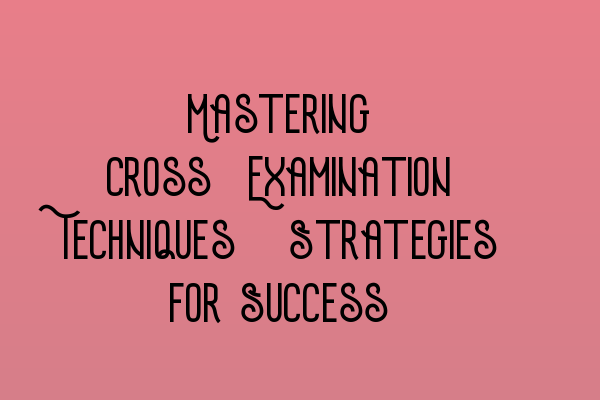Mastering Cross-Examination Techniques: Strategies for Success
As a criminal law professional, the ability to effectively conduct cross-examination can make all the difference in the outcome of a case. Cross-examination is a crucial part of the trial process, where the lawyer has the opportunity to question opposing witnesses to challenge their credibility, expose inconsistencies, and bring out the truth. It requires a combination of skill, strategy, and preparation to excel in this area. In this article, we will explore some valuable techniques that can help you master the art of cross-examination and achieve success in the courtroom.
1. Understand the Witness
Before diving into the cross-examination, it is essential to thoroughly understand the witness you are about to question. Research their background, previous statements, and any relevant information that can help you expose weaknesses in their testimony. This knowledge will enable you to ask targeted questions that undermine the witness’s credibility and strengthen your case.
2. Set Clear Objectives
Prior to cross-examination, it is crucial to establish clear objectives. What do you hope to achieve through your questioning? Are you aiming to cast doubt on the witness’s reliability or expose contradictions in their statements? By defining your goals, you can structure your cross-examination in a way that maximizes your chances of success.
As you craft your questions, bear in mind the key points you want to highlight and the evidence you want the witness to confirm or deny. This strategic approach will help you stay focused and prevent unnecessary detours during the examination.
3. Control the Narrative
Effective cross-examination requires the ability to take control of the narrative and shape it in your client’s favor. Craft your questions in a way that forces the witness to provide concise and specific answers. Avoid providing the witness with open-ended questions that allow them to elaborate or digress from the main points. Instead, ask questions that lead to a simple “yes” or “no” response.
By maintaining control over the questioning, you keep the witness from providing unnecessary details that could potentially harm your case. It also allows the jury to focus on the key facts that support your argument.
4. Use Leading Questions
Leading questions are an essential tool in cross-examination. These are questions that suggest the desired answer and limit the witness’s ability to provide lengthy explanations. By using leading questions, you can steer the witness towards supporting your case while limiting their ability to introduce damaging information.
For example, instead of asking, “What did you see on the night of the incident?” you could ask, “Isn’t it true that you saw the defendant at the crime scene on the night of the incident?” This approach increases the likelihood of eliciting a response that corroborates your theory of the case.
5. Avoid Confrontation
While cross-examination may involve challenging the witness’s credibility, it is important to strike a balance between assertiveness and aggression. Avoid engaging in unnecessary confrontations or attempting to humiliate the witness. Remember, the goal is to undermine their credibility through thoughtful questioning, not to alienate the jury or create sympathy for the witness.
Keep your tone professional and maintain a calm demeanor. The less emotional you appear during cross-examination, the more persuasive your arguments will be.
6. Practice, Practice, Practice
Like any skill, mastering cross-examination requires practice. Conduct mock examinations with colleagues, join cross-examination workshops, and learn from experienced practitioners. By replicating realistic courtroom scenarios, you can refine your techniques, identify areas for improvement, and build confidence in your abilities.
Additionally, taking advantage of SQE 1 and SQE 2 preparation courses can provide you with the necessary knowledge and guided practice to hone your cross-examination skills. These courses offer invaluable resources, such as practice exam questions, mocks, and expert guidance, to help you excel in the crucial areas of criminal law.
Remember, a well-executed cross-examination can significantly impact the outcome of a trial. By following these strategies and continuously refining your techniques, you can become a formidable force in the courtroom, effectively advocating for your clients and achieving success in criminal law.
If you are interested in further honing your legal skills, exploring SQE 1 practice exam questions, or preparing for the SQE 2 exam, you can find valuable resources and courses by visiting the following links:
